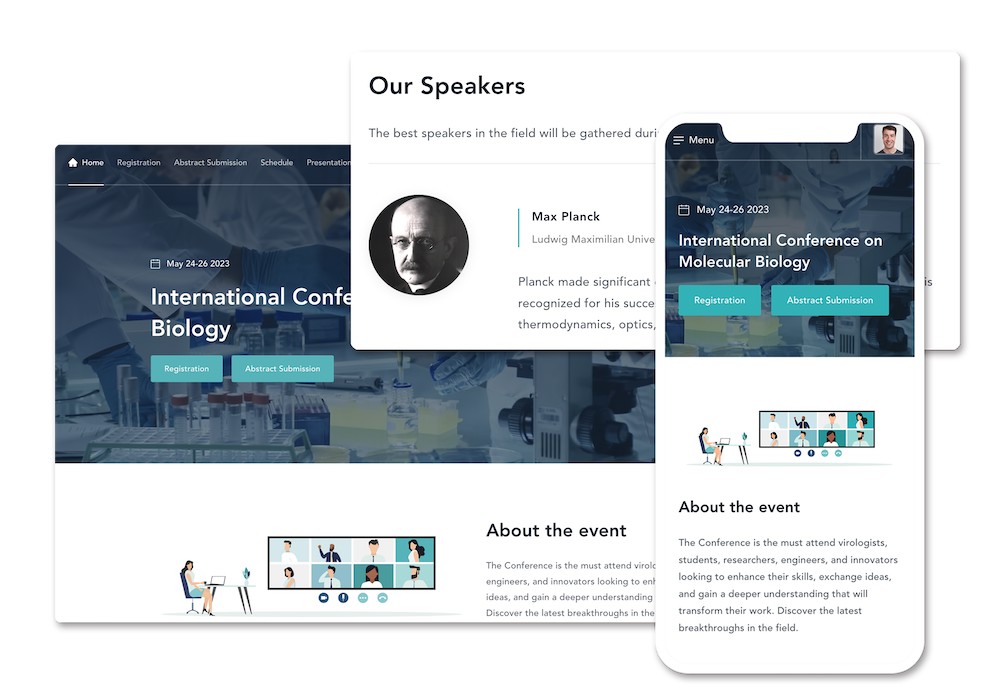Conference Marketing: A Complete Guide For Academic Events
Academic conferences are vital for knowledge dissemination, networking, and fostering collaboration among researchers. However, hosting a successful academic event requires more than just compelling content and knowledgeable keynote speakers. It requires effective marketing to ensure that your conference reaches the right audience and maximizes its impact.
In this comprehensive guide, we'll walk you through the essential steps of conference marketing to help researchers and event organizers elevate their academic events.
Before diving into the intricacies of conference marketing, it's crucial to understand why it matters. Academic conferences are not just academic gatherings; they are opportunities to share groundbreaking research, build professional networks, and advance careers.
Effective marketing is the key to attracting attendees, speakers, and sponsors, ultimately making your event a resounding success.
Manage submissions, peer-reviews, registrations and more.
1. Understanding Your Audience
Identify Your Target Audience
The first step in conference marketing is to define your target audience. Understanding who your event is for will shape your marketing strategy.
Are you catering to researchers in a specific field, graduate students, or industry professionals?
Each group may require a different approach.
Audience Segmentation: Personas
Once you've identified your audience, consider segmenting it further with personas.
By creating detailed audience personas, you can tailor your marketing efforts to the specific needs and interests of different attendee groups. It’s a lot easier to know what to say when you know who you’re talking to.
To create audience personas for your academic event, you can conduct research and surveys among your target audience and last year’s event attendees to gather insights about their demographics, interests, and pain points.
Then, group this information into distinct personas, complete with names and detailed descriptions, highlighting their motivations, challenges, and goals related to attending academic conferences.
Here is an example of audience persona:
Doctoral Student Danielle:
- Background: Danielle is a doctoral student in biology, in her late twenties.
- Goals: She wants to present her research findings to gain feedback, network with potential collaborators, and improve her academic profile.
- Challenges: Limited budget, time constraints due to coursework, and the need for guidance in navigating academic conferences.
- Interests: Research publications, networking opportunities, and workshops to enhance her research skills.
So what would Danielle want from your event? What would peak her interest? What emails or social media posts would entice her to participate in your event?
These personas will serve as invaluable reference points to tailor your conference marketing strategies and content to resonate with specific audience segments.
This can also help you determine whether an in-person or virtual event would work better, which keynote speakers or topics should be included, and even the event date.
Setting Clear Goals
Specific and Measurable Goals
Setting clear and measurable marketing goals is paramount. Common conference marketing goals include;
- Increasing attendee registrations,
- Securing abstract submissions,
- Attracting sponsors.
Make sure your goals are specific, measurable, achievable, relevant, and time-bound (SMART). This will ensure that you can, and likely will attain your goals.
Here's an example of a SMART goal for an academic event:
“Increase the number of registered attendees for the Annual International Psychology Conference from 300 to 500 within the next three months.”
Specific: Increase the number of registered attendees from 300 to 500.
Measurable: You can track and measure attendee registrations through your conference management platform.
Achievable: We will achieve this by implementing targeted marketing strategies, including email campaigns, social media promotion, and partnerships with academic institutions, to attract a broader audience.
Relevant: This goal aligns with our conference's objective of promoting knowledge exchange and networking within the field of psychology.
Time-Bound: We aim to reach this goal within the next three months, leading up to the conference date on [specific date].
Ensure that your marketing goals align with the overarching objectives of the conference. Whether it's disseminating research, fostering collaboration, or promoting a particular field, your marketing plan should support these objectives.
Crafting a Compelling Conference Brand
A strong conference brand can make a significant difference in attracting conference attendees. Choose a unique conference name, design an eye-catching logo, and craft a memorable tagline to create a brand identity that resonates with your audience.
Maintain brand consistency across all marketing materials, including your website, social media profiles, and promotional materials. Consistency builds trust and recognition.
Creating a Robust Online Presence
The Central Hub: Your Conference Website
Your conference website serves as the central hub for information. Ensure it's user-friendly, mobile-responsive, and contains all the essential details attendees need, from schedules to speaker bios and registration page.
Make sure you design a complete event website so your attendees have all the information they need.

Fourwaves event website
You can use an all-in-one conference management system like Fourwaves to create your event website.
You can even try it for free.
The Power of Social Media Strategies
Leverage social media platforms to engage with potential attendees. Share updates, engage in conversations, and create buzz around your event. Each platform has its strengths; choose the ones that align with your audience.
Here are a few tips on how to leverage social media for your event.
1. Choose the Right Platforms:
Identify which social media platforms your target audience frequents the most. Common platforms for academic conferences include Twitter, LinkedIn, and Facebook. However, niche platforms or professional networks may also be relevant.
2. Develop a Content Strategy:
Plan a content calendar that outlines when and what type of content you'll post in the lead-up to the conference. Content should include announcements, speakers' profiles, important dates, and engaging posts related to the conference theme or field.
3. Engage Your Audience:
Respond promptly to comments, questions, and messages on your social media posts. Engagement fosters a sense of community and encourages attendees to share their excitement. Use interactive content such as polls, quizzes, and live Q&A sessions to engage with your audience.
4. Utilize Hashtags:
Create a unique and memorable event hashtag (e.g., #PhysicsSymposium2024) and encourage attendees, speakers, and sponsors to use it in their posts. Regularly monitor the hashtag to track discussions and engage with users.
5. Visual Content:
Share visually appealing content, including images, infographics, and short videos, to grab attention and convey important information. Use graphics to announce speakers, highlight key sessions, and showcase venue details.
6. Partner with Influencers:
Influencer marketing isn’t just for bikinis and skinny tea. Collaborate with influencers or thought leaders in your field who can help promote your event to a wider audience. They can share their insights, experiences, and excitement about the conference with their followers.
7. Paid Advertising:
Consider running paid advertising campaigns on social media platforms and Google to reach a larger and more targeted audience. Use platform-specific targeting options to ensure your ads reach users who are likely to be interested in your event. You can segment per interests, job title, university, location, and more.
8. Monitor and Analyze:
Regularly monitor the performance of your social media campaigns. Most platforms provide analytics tools to track engagement, reach, and other important metrics. Use these insights to refine your content strategy and make data-driven improvements.
By following these steps and consistently engaging with your audience, you can effectively leverage social media platforms to promote your academic conference and create buzz within your target community.
Leveraging Content Marketing
The Value of Content
Content marketing is a powerful tool for promoting academic conferences. Create valuable content such as blog posts, webinars, whitepapers, and videos that highlight the significance of your event.
Content Creation and Distribution
Develop a content calendar and strategy. Distribute your content through various channels, including your website, social media, and email newsletters.
You can also use SEO (search engine optimization) to your advantage. Create blog posts and web pages that could rank for keywords your target audience might search, such as: “Microbiology seminar in New York” or “San Diego Conference for Gynecologists” or simply the name of your event.
Email Marketing and Outreach
The Role of Email Marketing
Email marketing remains one of the most effective ways to reach potential attendees, speakers, and sponsors. Build and segment your email list to ensure personalized outreach.
Crafting Effective Outreach
Craft compelling email templates for outreach, and personalize your messages.
You could, for example, write templates for attendees, to guide them through the event from registration confirmation to updates about the event, and how to download the on-demand content after the conference. This would likely increase event engagement.
Another series of templates could be to reach out to potential sponsors or keynote speakers. It’s also very easy to craft emails for paper submitters, and let them know the status of their peer-review.
You can also reach out to sponsors and partners so they can email their own audience to promote your event.
Engaging Speakers and Sponsors
Attracting High-Profile Speakers
High-profile speakers can draw in attendees. Reach out to respected figures or industry leaders in your field and highlight the value of speaking at your event.
The Sponsorship Advantage
Sponsorships provide crucial financial support and enhance the conference's prestige. Approach potential sponsors with compelling sponsorship packages.
There are multiple tips to craft a great sponsorship plan for your conference, make sure to take advantage.
Tracking and Measuring Success
Identify key performance indicators (KPIs) to track your marketing efforts. Common KPIs include website traffic, email open rates, registration numbers, and social media engagement.
Use analytics tools to monitor your marketing performance. Gain insights from data to adapt and improve your strategies.
Budgeting and Resource Allocation
Budgeting for Success
Plan your marketing budget carefully, allocating resources for various marketing channels. Be mindful of cost-effective strategies and ROI.
You can use a conference budget template to help you stay on track.
Strategically allocate your resources to maximize return on investment. Consider cost-effective digital marketing techniques and explore partnerships.
Conclusion
Effective conference marketing is a complex but rewarding endeavor. By understanding your audience, setting clear goals, crafting a compelling brand, creating an online presence, leveraging content marketing, and engaging speakers and sponsors, you can increase the visibility and success of your academic event.
Keep tracking your progress, adapt your strategies as needed, and remember that marketing is an ongoing process that requires dedication and creativity.
With this comprehensive guide in hand, you're well-equipped to tackle the marketing challenges of your academic conference.
Good luck, and may your event be a resounding success!


